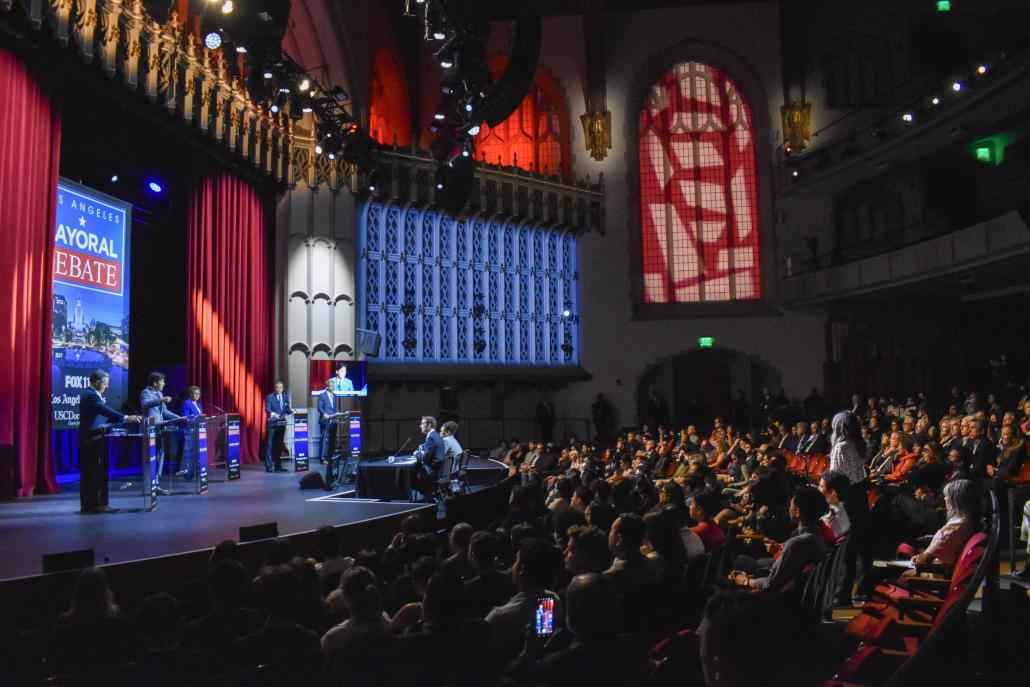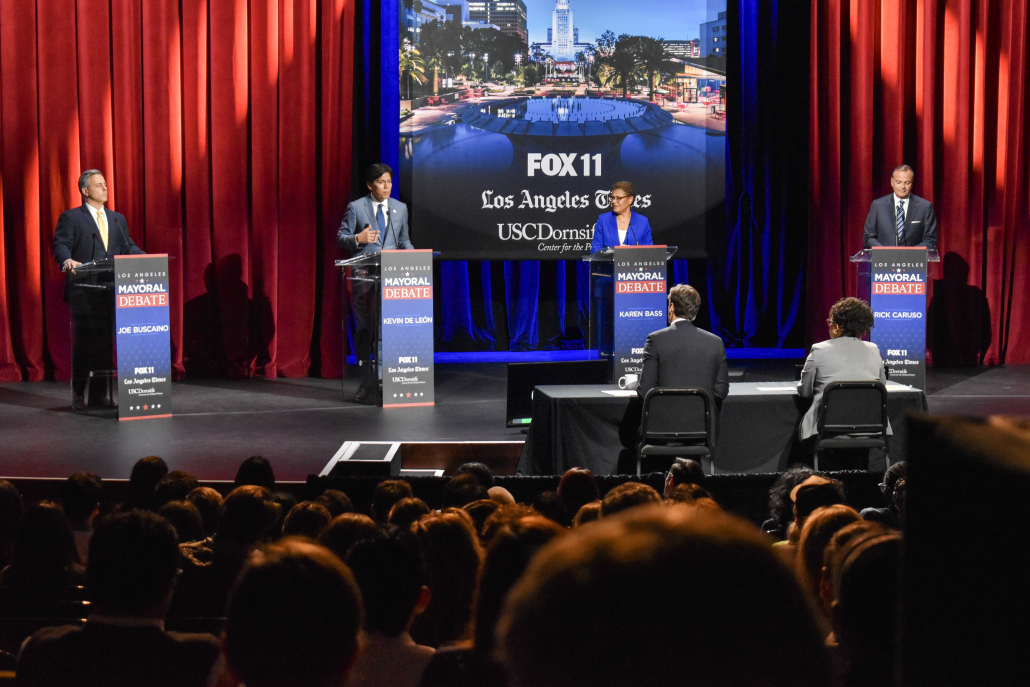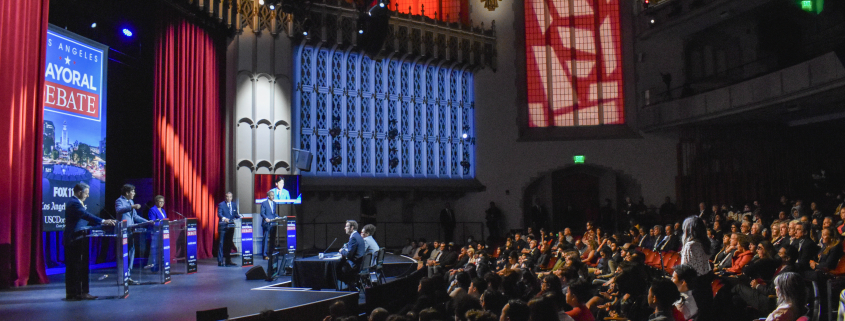Candidates take Bovard stage

Students, members of the press and on-campus political organizations gathered in Bovard Auditorium Tuesday to watch the top five candidates for Mayor of Los Angeles debate on pressing issues, including homelessness, late-stage coronavirus responses and affordable housing.
The candidates in attendance were Congresswoman Karen Bass, L.A. City Councilmembers Kevin De Leon and Joe Buscaino, City Attorney Mike Feuer and real estate developer and chair of the USC Board of Trustees Rick Caruso. The debate was moderated by Los Angeles Times columnist Erika Smith and FOX 11 anchor Elex Michaelson.
Leading up to the debate, event organizers and student volunteers manned tables outside Bovard, checking in audience members and the press, while others escorted media to designated pressrooms.
Debate volunteer Ara Yacubian, said he finds the debate an opportunity for students to see first hand how the political system works and how they can be a part of it.
“It’s important [to] tell students that these candidates are here — they want to listen to you,” said Yacubian, a senior majoring in political science and international relations. “The fact that USC is hosting it, the fact that students are staffing the event, the fact that we have single candidates that are polling well on the stage means that they want to hear from us.”
Chloe Hirth, a junior majoring in political science, communications and public policy, asked the mayoral candidates a question about their tangible actions to make the city more equitable for Angelenos, with most candidates mentioning family income and funding disparities within different areas of the city.
“Across the board, whoever wins [the election is] going to have to work with other people … It’s really important to me to hear about those tangible action items, as well as how they’re going to make those work on both sides of the aisle,” said Hirth after the debate.
Some of the candidates employ current students as their interns, such as Edith Saucedo, a junior majoring in political science who works on De Leon’s campaign. She said she was excited to see De Leon talk about issues particular to students of color during the debate, and said she believes that, for USC students, having more representation in government is really important.
“As a person of color, I feel like he does represent the minority,” Saucedo said. “I’m just excited for what he has to say. I’ve worked on his team, and I’ve been inspired by his message.”
During the debate, De Leon highlighted how he is running for mayor for the working people of L.A. — specifically reaching out to women of color and mothers, calling them “the backbone” of the city.
“Without you, the city would crumble,” De Leon said. “That is why I am running for each and everyone of you, not the wealthy or elites, but the working people.”

De Leon claims he has created more housing than any of the other candidates, helping to build one of the largest tiny home villages in the nation, Arroyo Seco Tiny Home Village.
Like many candidates, he plans to expand the number of housing units built. De Leon’s specific plan is “25×25”— constructing 25,000 livable units by 2025.
Bass, Feuer and Caruso’s homelessness platforms all include declaring a state of emergency on their first days in office. Bass additionally plans to hire a “housing chief.” Both Bass and Feuer also plan to collaborate with the private sector to expedite building and find temporary housing while shelters are being built. Caruso championed his homelessness plan as “comprehensive” and encouraged debate viewers to look it up on his website.
Councilmember Buscaino’s plan includes legislation against homeless encampments on L.A. streets, mentioning during the debate the need for a “no-camping law that has teeth.” This would include introducing a policy where an unhoused individual would be given three opportunities to opt into a city-provided bed before facing forced relocation. Congresswoman Bass pushed back and said she does not believe criminalizing poverty is a solution when many unhoused individuals have health conditions, including mental illnesses, that hinder people from making the choice to opt in.
“I’ve actually called on the state to reform mental health,” said Buscaino in an interview with the Daily Trojan following the debate. “You have to give people options and give choices, because the sidewalk should not be available when a safer place is available for them.”
Debate attendee Minji Kang, a junior majoring in political science and communication, said she went into the debate hoping to see a candidate who will “actually support the change of L.A.,” rather than just make “empty promises.” Although Kang works on and supports De Leon’s campaign, she said some of Bass’s comments stood out to her.
“I would have to say Karen Bass’ comments on working with the president everyday definitely had some sway in the public, and I definitely see the appeal of a very strong Congresswomen making change in L.A.,” Kang said.
Kang said she believes high rent, unemployment and public safety are the issues most pressing for USC students and that although students may feel “doomed” about the future of L.A., they should feel hopeful at the same time.
The candidates’ stances on public safety varied, as De Leon highlighted the importance of using current police funding more efficiently, while candidates such as Buscaino, Feuer and Caruso said they look to expand the police force. Bass said she aims to increase the number of officers on the street but replace desk positions with civilians. All candidates said they plan to implement some level of mental health assistance in addition to changes to LAPD, with De Leon, Bass and Caruso wanting to implement mental health professionals and caseworkers.
During the debate, Feuer recalled a story his father told him, which encouraged him to live a life of service. In an interview with the Daily Trojan after the debate, Feuer spoke about his involvement in drafting the same-day voter registration law, which allows last-minute voters to vote immediately after registering. To Feuer, there is nothing more important than inspiring young people to engage in work that they deem important.
“[The debate is] an opportunity, I think, for young voters to understand the possibility that their individual talent can change the world,” Feuer said.

